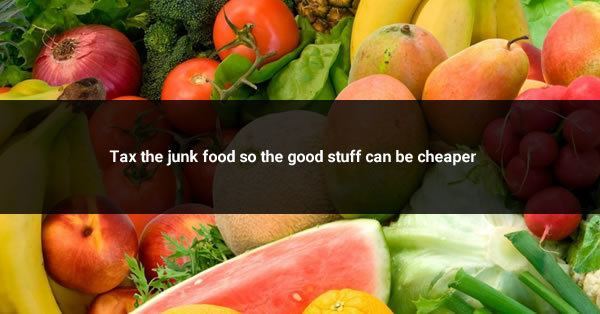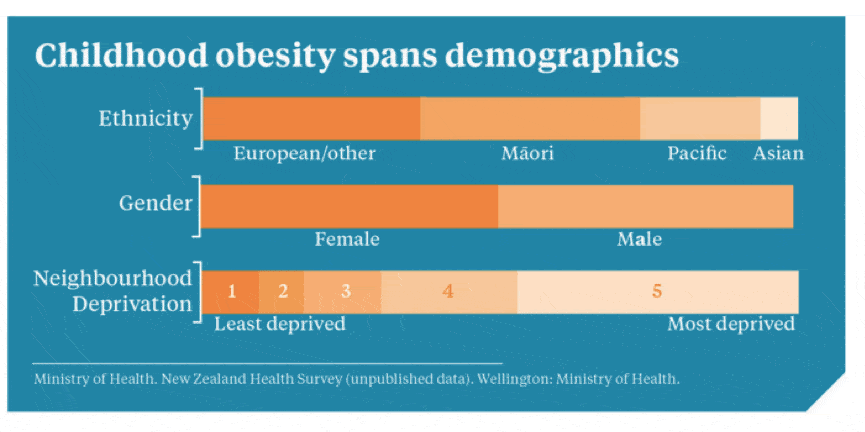We know that having a lower income means you are far more likely to be obese -particularly the children of low income families. A corporate-funded New Zealand think tank has published a report which questions whether the word “poverty” is really appropriate for people who are overweight. The report’s purpose appears to question whether obese people can really be considered poor?
The answer is a resounding yes – obese kids can even be malnourished. The fact is that obesity isn’t necessarily about eating too much, but is prevalent when we eat too much of the wrong kinds of foods.
NZ Initiative Report
We previously discussed a new report by the New Zealand Initiative which considered how poverty gets measured. Amongst an otherwise well-researched report, one particular paragraph stood out – and scaringly so – that we had to comment on it:
It also raises a question as to the deeper causes of child hunger today. The complexity of the issue is illustrated by a Ministry of Health finding that those living in the most deprived areas in New Zealand are four times more likely to be extremely obese as those living in the least deprived areas. It is somewhat incongruous to use the same word “poverty’ to refer to situations of hunger and obesity.
It’s not incongruous at all – unless one has a preconception of obesity being solely the result of eating too much. However the incidence of obesity, and with it a higher rate of obesity-related illnesses, is not that simple. The composition of diet is critical, as is the population’s precondition before dietary changes occur that drive the condition.
Obesity has clear relationship with income
Actually there is an empirical relationship between obesity and income in New Zealand but it runs counter to that the NZ Initiative would like to suggest. As can be seen by the graph below, kids living in families with the poorest neighbourhoods are four times more likely to be obese than those living in the richest. Obesity is also relatively prevalent amongst Maori and Pasifika communities.
So not only are the poorest kids not thinner than the rest of the population as the stereotypical preconception would have, they are actually fatter. What might be driving that in the New Zealand context?
Education
Education (or the lack of it) might be one reason. Around half of Kiwis don’t understand how to eat healthily, and these people are overwhelmingly more likely to be poor. They are therefore more likely to make poor dietary choices, and end up obese.
Is that enough to explain the obesity epidemic? Sadly no. Education alone certainly can’t explain why some people (and indeed some ethnicities) suffer from obesity and diabetes far more than others.
Genetics and Upbringing
In developing nations we are seeing more and more people who are simultaneously malnourished and diabetic. So they are simultaneously poor, and suffering from the “diseases of affluence”. For example in Bangladesh (where the Morgan Foundation happens to fund a hospital that deals primarily with obesity-related diseases amongst the destitute and malnourished) diabetes is a major disease. It has exploded because a population that historically has been chronically malnourished and has, over recent decades, been exposed to refined carbohydrates. Even though it has been a small amount – certainly on the scale we’ve evolved to absorb – it has been too much for the digestive systems of many of the impoverished in Bangladesh. The result has been an outbreak of diabetes amongst the malnourished. It would be obscene to suggest this population is not poor – on any measure.
At the core of the problem is a mismatch between evolution and the modern food environment. Our Prime Minister’s Chief Science Adviser has even written a book about this issue. In simple terms, if our bodies think we might face a food shortage, they are more likely to store energy as fat.
In evolutionary terms, the bodies of Asians and Polynesians are programmed to be more concerned about famine – so when they eat more energy than they need, their bodies store that energy as fat. In a modern environment where refined grains and sugar are plentiful and cheap, they are far more prone to diabetes and obesity.
Actually the same thing can happen to anyone in the first few years of their life. If a developing body is starved of nutrients (either through starvation or a poor diet of processed foods) then their bodies can develop this tendency to store fat. This makes it far harder for that person to control their weight than it is for others. So actually a diet of highly processed foods can be a double whammy – it can programme a growing body to store fat, and then provide that fat.
Further, there is work now showing that people that get over-exposed to biota-destroying drugs (such as anti-biotics) can lose the bacteria balance in the gut that is essential to digest food properly. This upsets their production of insulin, which means the person is far more susceptible to diabetes – from the same food they’ve been eating all their life.
The stereotypical inference that obese people just eat too much and can’t possibly be poor if they can afford to do that runs contrary to medical science. It simply has no evidence base and only serves to protect a food industry that is creating the problem by churning out highly processed food. The problem isn’t that the poor are eating too much, it is that they are eating the wrong things
The fact is that viewing food as a vehicle for delivering energy to a person is seriously outdated. Growing bodies need energy, but there is plenty of that around in today’s world. What modern, highly processed foods lack are micronutrients. These have been stripped out to make food last longer, so it can be cheaper. They offer more energy for each dollar spent, which makes them more attractive to the poor. Unfortunately this exactly the kind of food that is more likely to be stored as fat.
We can’t change the programming of our bodies. We can educate people, but that takes a long time, and will only achieve so much. What we can change now is the price of highly processed food so that the poor no longer see it as a bargain. We can use the money raised to make real food cheaper, so that people can choose food that will nourish them in the long term. We can create an environment where healthy food is the norm, so that parents don’t have to constantly fight to turn them away from processed unhealthy food.
This may well have been a throw away line in a report. But it is symptomatic of a dangerous lack of understanding of the issues that are behind the obesity epidemic. We can understand this sort of myth existing because it serves those who like to believe that poverty and processed foods aren’t a problem, but it should not be perpetrated by researchers.
Dr Morgan is a member of The Lancet’s Global Obesity Commission, currently working on a project to describe the system-wide drivers of obesity-related diseases, including why malnourishment and diabetes are coincident in developing countries.


